It was Belarus, early 1940s, I imagine you became whatever nationality wasnt getting butchered at the specific time you were asked what nationality you were :(
The story about German- Polish reconciliation
hague1cmaeron 14 | 1366
6 Apr 2012 / #92
I imagine you became whatever nationality wasnt getting butchered at the specific time you were asked what nationality you were :(
Well lets face it, self preservation and survival is your primary goal, that is a pretty good way to play it(:
Couple more Polish named generals for moania to get knickers twisted about
Do you think I will pay any attention to Nazi generals who`s roots are 10 -th generation Polish .You can find villains in any nationality Some of those German generals who served in a the Polish army prove the fact that Poland appealed to them .
Doesn't the Wikipedia article acknowledge that?
No , it doesn`t , his was born in Germany as a third generation of Polish emigrants ,but only on father`s side, his mother was German , so he was only half Polish .
although, surprise surprise, on wiki's warsaw uprising page the "Zelewski" bit is missing
He had the Zelewski bit officially removed from his name in November 1941. So he was strictly von dem Bach at the time of Warsaw Uprising.
I posted this fragment long ago in some other thread:
Michał Żelewski (1700-1785) + Ewa von Kętrzyńska. Owned (still existing) villages in Pomerania: Milwino, Niepoczołowice and Zakrzewo
|
Andrzej Klemens von Zelewski + Konkordia Wilhelmina Henrietta von Grubba
|
Otton August Ludwik Rudolf von Zelewski + Antonia Fryderyka von Żelewska (apparently from another Zelewski family)
|
Otton Jan Józefat von Zelewski + Elżbieta Ewelina Szymańska
|
Erich Julius Eberhard von dem Bach-Zelewski
This is utter nonsense! I know this happened once to a non-married Polish father of a child with German citizenship,
She's most likely referring to a boring old story which has been discussed on PF ad nauseam. Try to find the thread if you're interested (look for postings of Bratwurst Boy), and you will see that there is much more to it than the primitive black and white picture Monia is trying to paint.
hague1cmaeron 14 | 1366
8 Apr 2012 / #96
Poland's foreign minister has gone beyond mere reconciliation, and has set out on building a close relationship. This is his recent statement delivered to Parliament:
" On account of our bilateral trade, but also increasingly due to the similarities between our economic cultures and political concepts, Germany is our most important European partner. Whether we look at its population, GDP, or the voting powers acquired under the Lisbon Treaty, Germany is the biggest shareholder in the European Union . The ‘biggest’ – with around one-fourth of shares – but not the ‘dominant’ one. This means that it is difficult to get anything done in the EU against Germany’s will, but it also means that in order to implement its ideas, Germany must look for more than just one partner. If a given endeavour is at risk, obviously it is the biggest shareholder that has the greatest responsibility – and the most means – to come to the rescue. We want to work together towards a stronger Union. As I said to our German friends during my speech in Berlin: “Provided you include us in decision-making, Poland will support you.”"
He describes Germany as Poland's most important European partner.
" On account of our bilateral trade, but also increasingly due to the similarities between our economic cultures and political concepts, Germany is our most important European partner. Whether we look at its population, GDP, or the voting powers acquired under the Lisbon Treaty, Germany is the biggest shareholder in the European Union . The ‘biggest’ – with around one-fourth of shares – but not the ‘dominant’ one. This means that it is difficult to get anything done in the EU against Germany’s will, but it also means that in order to implement its ideas, Germany must look for more than just one partner. If a given endeavour is at risk, obviously it is the biggest shareholder that has the greatest responsibility – and the most means – to come to the rescue. We want to work together towards a stronger Union. As I said to our German friends during my speech in Berlin: “Provided you include us in decision-making, Poland will support you.”"
He describes Germany as Poland's most important European partner.
MediaWatch 10 | 942
8 Apr 2012 / #97
Interesting post.
People here can correct me if I'm wrong, but as far as I know, Polish leader Tusk has decent relations with German Chancellor Angela Merkel.
Things will never be perfect between Germany and Poland (no neighboring nations have perfect relations) but considering their history, I think Poland and Germany today deserve credit for having cordial relations.
As even the German nationalist former blogger "Bratwurstboy" said in so many words, even if Germany is the leader of Europe "it makes things so much easier for Germany to have decent relations with its neighbors then not to do so". The same applies to Poland.
No matter how powerful or secure a nation may feel about itself, it is ALWAYS much more desirable for that nation to have decent relations with its neighbors. As Bratwurstboy said in so many words, life between neighboring nations is so much easier that way.... then to the contrary.
He is right about that and I think that notion is not lost upon both Germany and Poland today. Both countries deserve credit for realizing this and trying to be good neighbors to each other to the degree they can be.
People here can correct me if I'm wrong, but as far as I know, Polish leader Tusk has decent relations with German Chancellor Angela Merkel.
Things will never be perfect between Germany and Poland (no neighboring nations have perfect relations) but considering their history, I think Poland and Germany today deserve credit for having cordial relations.
As even the German nationalist former blogger "Bratwurstboy" said in so many words, even if Germany is the leader of Europe "it makes things so much easier for Germany to have decent relations with its neighbors then not to do so". The same applies to Poland.
No matter how powerful or secure a nation may feel about itself, it is ALWAYS much more desirable for that nation to have decent relations with its neighbors. As Bratwurstboy said in so many words, life between neighboring nations is so much easier that way.... then to the contrary.
He is right about that and I think that notion is not lost upon both Germany and Poland today. Both countries deserve credit for realizing this and trying to be good neighbors to each other to the degree they can be.
hague1cmaeron 14 | 1366
8 Apr 2012 / #98
I think Poland and Germany today deserve credit for having cordial relations.
I think i would describe them as warmer than cordial. As you mentioned Tusk and Merkel get along really well. The last three German Presidents have chosen Poland as their first foreign destination. And they have instituted annual cabinet to cabinet meetings to discuss issues of common interest and general political initiatives.
The last three German Presidents have chosen Poland as their first foreign destination.
Yeah,thats generally the problem with German leaders ;)
So, back to topic.
Yes, high time.
The last post on topic was
Right after signing the border treaty, German Chancellor, Willy Brandt, decided to make an even more spectacular move. He honoured Poles of Jewish descent who perished by German hands during WW2.
What happened next?
In 1970s, the communist leader of Poland, Edward Gierek, had very close relations with West German Chancellor, Helmut Schmidt. The latter often visited Poland. Both leaders signed a few minor treaties, and in 1975 West Germany agreed to grant the Polish faltering economy a substantial loan, while Polish communists began the repatriation of some 125,000 ethnic Germans to West Germany.
Helmut Schmidt developed a close relationship with Edward Gierek, whom he considered a friend and a reliable partner, characteristics that facilitated the conclusion of the October 1975 agreement, according to Schmidt.
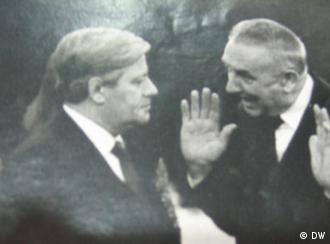
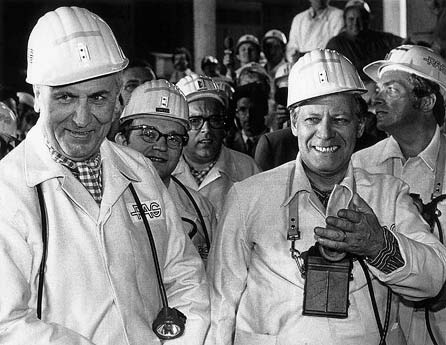
newworldencyclopedia.org/entry/History_of_Poland_%281945-1989%29
The story about German- Polish reconciliation
continued
In December 1981 Polish communists declared martial law. Solidarity was made illegal, restive workers arrested, striking mines and factories overpowerd by tanks and brutal police units. Shortages of food and other goods were prevalent. It seemed like the end of the world for many Poles.
Poland 1981

It was then when many Poles started to change their old perception of Germans. The latter stopped being viewed as Nazi murderers and revanchists obsessed with the desire to get back the Polish land. How?
Hundreds of thousands, if not millions Germans, private people with no connection with Poland whatsoever, participated in the Solidarity parcel campaign. About 30 million parcels, mostly with food, were sent to Poland since summer 1980 to late 1980s.. Poles who dealt with distribution of German aid all over the country say today they were impressed with the size of the aid. From 1981 the number of parcels increased by 625%.
The story in Polish
sdpz.org/?module=articles&category=37
In German
dradio.de/dlf/sendungen/europaheute/1629951/
And it is also mentioned in this book online:
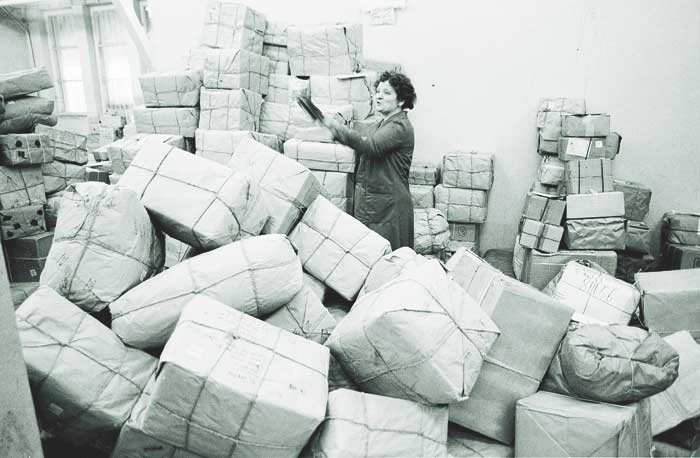
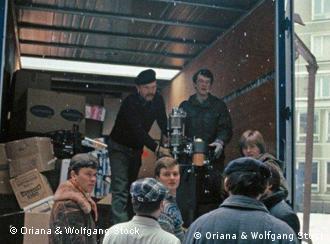
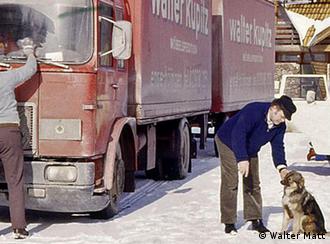
And interview with a German organiser of aid:
For Matt , the police commissioner crime such involvement was an individual act of reparation for what Nazi Germany made the Poles , but also the opportunity to show , " it was at that time also other Germany " . Behind this commitment was given honorary citizenship of the city of Lodz . But his involvement also attracted to renounce family life. Walter Matt helps people today who need assistance in Poland, supplying hospitals, nursing homes , rehabilitation care.
The film Solidarity parcels is a tribute to people who organised aid.
Well remember in Poland wrongs that we have done the neighbors behind the western border : relatives killed in concentration camps by the sea of ruins and rozkradzionych by invaders cultural property . It is interesting that the lived experience of good neighbors recalled only then ... Now is your chance to do it. Marks 30 years since the moments when ordinary people from all over the West open their hearts to the Poles and they moved us with a gigantic relief operation . At the head of this parade of good people walked Germany .
Complete story in Polish in an article called Thank you, Germans.
gosc.pl/doc/1044242.Dziekujemy-wam-Niemcy
Oh, come on - the Poles really quite love the Germans. It is not even so secret a love. Look at all the Mercedes and BMWs in Poland ... Poland wants to be Germany. It doesn't want to be Russia.
Poland wants to be Germany.
Nope. Poland doesn`t want to be Germany.
Poland wants to be LIKE Germany. With good roads, efficient management, low unemployment, high standard of life.
We are slowly getting at that.
With good roads, efficient management, low unemployment, high standard of life.
The costs are high, are you sure?
The costs of having bumpy roads, inefficient management, high unemployment and low standard of life are even higher than high.
Are you sure?
We went on a picnic out of Krakow today. I had checked the route and the 1990s map said that a country lane leading to the forest was good only for bikes, but not cars. On the spot, I found out the country lane is an asphalt road. Yes, very narrow, but very good anyway.
It was modernised in 2010.
Are you sure?
We are slowly getting at that.
We went on a picnic out of Krakow today. I had checked the route and the 1990s map said that a country lane leading to the forest was good only for bikes, but not cars. On the spot, I found out the country lane is an asphalt road. Yes, very narrow, but very good anyway.
It was modernised in 2010.
Poland wants to be LIKE Germany.
That's what I meant. It was artistic licence ...
Yes, I prefer human faces on those roads, among managers and over that kind of work, where the proverb Erst die Arbeit , dann das Vergnuegen says it all. Yikes.
Bumpy roads for me and one homeless life bitte ;))
Bumpy roads for me and one homeless life bitte ;))
Funky Samoan 2 | 181
2 May 2012 / #107
Yes, I prefer human faces on those roads, among managers and over that kind of work, where the proverb Erst die Arbeit , dann das Vergnuegen says it all. Yikes.
"Erst die Arbeit, dann das Vergnügen" may have been popular as a proverb in Germany until the 1960s, but the majority of 21st Century Germans does not take it too serious. Germany very much has developed into a leisure time society. Just look at German TV.
The story about German- Polish reconciliation
From the early 90s until the end of 2010 Germany has invested over 20 billion euros.
paiz.gov.pl/poland_in_figures/foreign_direct_investment
Germany has been also the main source of EU's structural funds flowing into Poland. Infrastructure being built, jobs created is enough for reconciliation.
Infrastructure being built, jobs created is enough for reconciliation.
Too simplistic.
"Erst die Arbeit, dann das Vergnügen" may have been popular as a proverb in Germany until the 1960s, but the majority of 21st Century Germans does not take it too serious.Germany very much has developed into a leisure time society. Just look at German TV.
I had more direct and extended contact with the culture. I ran away in fear ;)))
Funky Samoan 2 | 181
3 May 2012 / #111
I am German and I was born and raised in Germany. You can't beat that!
And if you think modern Germans only care about work and don't know how to enjoy their private lifes then you obviously know not very much about your western neighbour. "Erst die Arbeit, dann das Vergnügen" is one of the most primitive and out-dated cut and dried opinions about Germans. What is next? Germans have no hearts and are like robots?
This is just like if I said Poles are lazy and are not capable of organizing a state or other complicated organisations. This is what Germans were tought in Imperial Germany because the Prussians needed an apology why they helped to get rid of the Polish-Lithuanian Commonwealth.
Who are the Germans anyway? Between the mentalities of a Swabian and a Hamburger or a Rhinelander and a Brandenburger are worlds of differences.
And if you think modern Germans only care about work and don't know how to enjoy their private lifes then you obviously know not very much about your western neighbour. "Erst die Arbeit, dann das Vergnügen" is one of the most primitive and out-dated cut and dried opinions about Germans. What is next? Germans have no hearts and are like robots?
This is just like if I said Poles are lazy and are not capable of organizing a state or other complicated organisations. This is what Germans were tought in Imperial Germany because the Prussians needed an apology why they helped to get rid of the Polish-Lithuanian Commonwealth.
Who are the Germans anyway? Between the mentalities of a Swabian and a Hamburger or a Rhinelander and a Brandenburger are worlds of differences.
Will Maleken - | 2
3 May 2012 / #112
@Funky Samoan
You should stop talking nonsense and start to work ! Thanks
You should stop talking nonsense and start to work ! Thanks
jasondmzk
3 May 2012 / #113
Just look at German TV.
I did once, while vacationing in Karpacz. I gotta admit, the German version of MTV was pretty good.
I gotta admit, the German version of MTV was pretty good.
Yes, Germans are not as stiff as the stereotype says.
However, they still rank third after Russians (first) and Poles (second) when it comes to fun time. :):):):)
Here's the entire article in English ..
Thank you again for posting it.
Interesting excerpts:
Rubbing Their Eyes in Amazement
Much has happened since the Potsdam Conference in 1945, since former German Chancellor Willy Brandt kneeled at the memorial to the Warsaw Ghetto Uprising in 1970, and since the official recognition of the Oder-Neisse border in 1990. Relations between the two neighboring countries are now better than ever, at least officially. "I'm incapable of being angry with Angela Merkel," Tusk cooed about the German chancellor, with whom he is on a first-name basis. She gave the laudatory speech for Tusk when he was awarded the International Charlemagne Prize of the City of Aachen in 2010.
Much has happened since the Potsdam Conference in 1945, since former German Chancellor Willy Brandt kneeled at the memorial to the Warsaw Ghetto Uprising in 1970, and since the official recognition of the Oder-Neisse border in 1990. Relations between the two neighboring countries are now better than ever, at least officially. "I'm incapable of being angry with Angela Merkel," Tusk cooed about the German chancellor, with whom he is on a first-name basis. She gave the laudatory speech for Tusk when he was awarded the International Charlemagne Prize of the City of Aachen in 2010.
spiegel.de/international/europe/poland-has-become-the-success-story-of-eastern-europe-a-834413.html
In 1989 Eastern Germans started their exodus from their communist paradise. As they were allowed to travel to other communist countries in the region, they came in thousands and stormed embassies of West Germany in such cities as Prague, Budapest and Warsaw.
6000 East Germans fled through Warsaw. Initially they were helped by common Poles, who offered food, blankets, accommodation. The police, still communist, didn`t intervene, even helped some refugees jump over the fence of the embassy. Then the new Polish government joined officially and took proper steps. As Poles refused to return Germans to their country, they were accommodated in 80 guest houses in and near Warsaw, then transferred to the West in so called freedom trains or by plane.
[i]Compared to Prague or Budapest, Germans in Warsaw could say they were lucky guys, say ex refugess who visit Poland to bring back past memories. They still remember hospitable Poles who came to aid.

Car parks in Warsaw were full of Trabants
Such scenes as in Czech Prague which was still a stalinist country at the time, didn`t happen in Poland.
Prague, Czech communist police are trying to stop the refugees.
Poles, as always, for freedom - ours and yours! :):):):):)
delphiandomine 86 | 17813
17 Jun 2012 / #115
One of the saddest notes in DDR history was that the last victim who died trying to escape - died not escaping into West Germany, but rather he was killed trying to escape into Poland.
That last picture is taken from the fence of the West German embassy, if I remember rightly?
That last picture is taken from the fence of the West German embassy, if I remember rightly?
Poles, as always, for freedom - ours and yours
Great post Pawian!
That last picture is taken from the fence of the West German embassy, if I remember rightly?
Yes, exactly. Climbing West German embassy fences was a common sight at the time.
Great post Pawian!
Thank you, Sire, your appreciation is appreciated.
The story about German- Polish reconciliation
Poland's foreign minister said Wednesday that a decades-long effort at reconciliation with Germany, once a historic foe, "is pretty much done" and the two neighbors "are now at a stage of consummating" the relationship.
It would have once been unthinkable for a Polish leader to call for a more powerful Germany - and Sikorski's doing so sparked the anger of some Poles. Still, his tone shows just how far the relationship between the two European Union members has evolved more than 70 years after Nazi Germany invaded Poland and subjected the country to a brutal occupation that killed 6 million Polish citizens.
Sikorski spoke Wednesday during a discussion in Warsaw alongside Henry Kissinger, the 89-year-old former U.S. Secretary of State. The event was billed as a debate, but the two generally agreed when asked about Europe's foreign policy before an audience that included diplomats and academics.
delphiandomine 86 | 17813
27 Jun 2012 / #119
Poland's foreign minister said Wednesday that a decades-long effort at reconciliation with Germany, once a historic foe, "is pretty much done" and the two neighbors "are now at a stage of consummating" the relationship.
Pretty much. Germany is seeing Poland as a powerful partner - even the recent summit between France-Germany-Poland tells you that in the future, Germany is going to rely much more on Poland than on Italy/Spain.
All good news for Poland - the country is growing up, it's seen as stable and on the right path.
All good news for Poland - the country is growing up, it's seen as stable and on the right path.
Indeed
 PolishForums LIVE / Archives [3]
PolishForums LIVE / Archives [3]